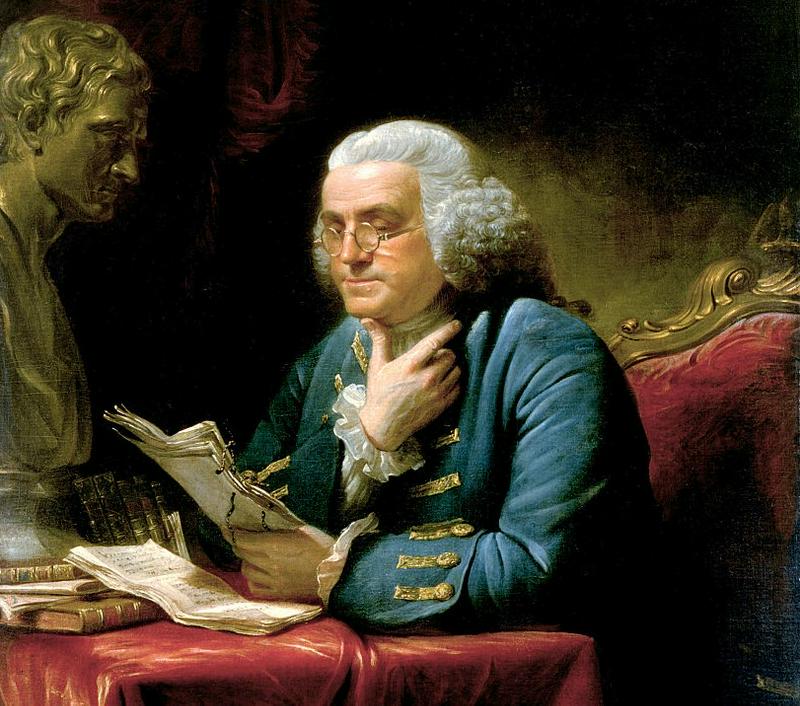Benjamin Franklin: Biography, Trivia, And Facts About The Founding Father
By | January 15, 2021

The guy from the Dos Equis commercials might be the most interesting man in the world, but in the 1700s, that title could have easily gone to Benjamin Franklin. He was a true Renaissance man, not only a charming intellectual but also a politician, writer, postmaster, printer, inventor, and much, much more.
Franklin's Early Life
Ben Franklin was the 10th child of 17 kids and often lost in the shuffle, once quipping that he was "the youngest son of the youngest son for five generations back." As a result, he couldn't expect much of an inheritance, so he was determined instead to get by on his mind. He learned to read quite early, and he was mostly self-taught, possessing only two years of formal education. When he was 12 years old, Franklin was apprenticed to his brother, who started The New-England Courant in 1721, to learn the craft of printing.
Franklin fancied himself a writer and first took up poetry but soon discovered that, as much as he loved reading it, he wasn't very good at writing it. He switched to prose with much more success, noting that learning to write well was "of great use to me in the course of my life and was a principal means of my advancement." He first showed off his writing chops when he was 16 years old in a series of 14 essays that he sent to the Courant under the pen name of Silence Dogood. Even Franklin's brother didn't know he was the writer, remarking that Ms. Dogood appeared to be a highly educated and sophisticated world traveler.

Partying In London
In his late teens, Ben Franklin and a buddy traveled to London, where he quickly found work as a printer, swam the Thames from Chelsea to Blackfriars (he was a lifelong swimming enthusiast and even inducted into the Swimming Hall of Fame in 1968), and partied it up with the young London ladies. The fact that he had a girlfriend back home who he'd promised to marry upon his return didn't deter him. In fact, around the same time, he published an essay in which he argued that no one can be held morally responsible for their actions if they have no true freedom of choice. Sure thing, Ben.
Whatever his motivations for writing the essay, Franklin made good on his promise to the future Mrs. Franklin, but it was a rocky marriage, plagued by infidelity that Franklin blamed on a strong sex drive that supposedly led him to seek the company of "women of low repute" and even abandon his wife for a time. When he reconciled with her, he brought his illegitimate son, William, to their home for her to raise alongside their own children.

Franklin The Inventor
Benjamin Franklin was a lifelong tinkerer, always thinking about problems and possible solutions. He developed a workable system for streetlights, made one of the first pairs of swim flippers, and designed a more efficient heating stove. After his experiments with lightning, he made metal lightning rods with ground wires which he placed on tall buildings to deflect the electricity of a lightning strike into the ground, saving countless homes and businesses from fires. He also created bifocal glasses to help himself read. Franklin never applied for any patents, feeling that it was more important to help as many people as possible with his inventions than to get rich.
As a writer and printer, Franklin spent a lot of time working with letters, and in 1768, he even invented his own alphabet. Feeling that the traditional alphabet was redundant and confusing, he emphasized sounds and pronunciation and omitted "unnecessary letters," including C, Q, J, X, W, and Y, from his alphabet. It might not have caught on, but his printing legacy endures in the form of the Franklin Gothic font, so named because Franklin appreciated the kind of sleek sans serif letters the font employs.
One of Franklin's most important contributions to modern society, however, happened by accident. When he was sent to France to negotiate treaties in 1784, he was annoyed that the bright summer Sun woke him up early every morning and suggested in a humorous essay that we rearrange our sleep times to coincide with the rising and setting Sun. When he returned to the States, he kept the bit going, proposing that we change our clocks twice a year to better align our daily schedules with the Sun. By all accounts, he meant it as a joke, but in the early 1900s, the idea gained traction.

The French Loved Franklin
Ben Franklin was quite advanced in age by the time his talents as a writer were tapped to assist with the Declaration of Independence. At 70 years old, he was the oldest person to sign the Declaration and the only Founding Father to sign it and the other three key documents used by the United States to gain its independence: the U.S. Constitution, the Treaty of Paris, and the Treaty of Alliance with France.
Franklin and France were well acquainted. In fact, he was somewhat of a legend in the land of champagne and cigarettes. His intellectual gifts and natural humor made him a star of the Parisian social scene and more than a few feminine French hearts, a feeling he returned with relish. When Franklin died on April 17, 1790 at the age of 85, the French National Assembly declared an official day of mourning to honor his passing.

